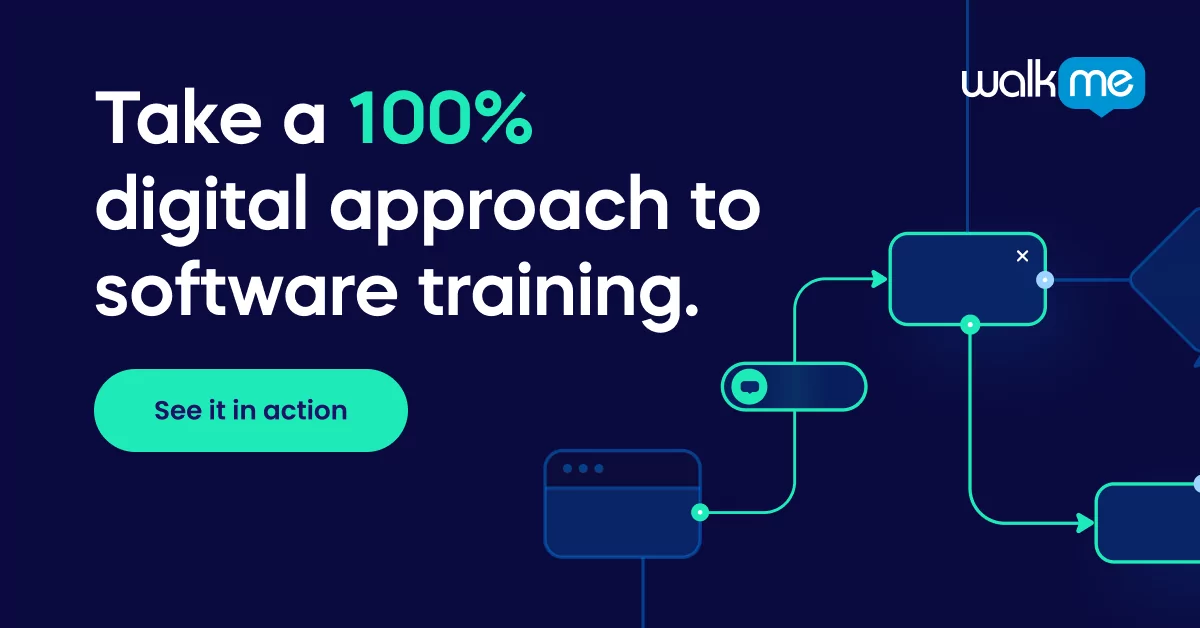Money is at the center of everything that happens in business. And planning is at the heart of coordinating how revenue is generated and allocated to ensure growth from a birds-eye perspective, as you can view and plan using all your resources.
LinkedIn Research shows that financial planning and analysis (FP&A) is the 13th fastest-growing role in the US, indicating the need for software like Workday Adaptive Planning due to its popularity in the FP&A field.
It is essential to understand the functions and importance of Workday Adaptive Planning as you strategize your financial plan for the coming year for optimal performance improvement.
This article will guide you through every element of Workday Adaptive Planning via the following topics:
- Workday adaptive planning overview
- What does Workday Adaptive Planning do?
- What are the benefits of Workday Adaptive Planning?
- What are the disadvantages of Workday Adaptive Planning?
Workday Adaptive Planning Overview
Workday Adaptive Planning is a financial planning and analysis (FP&A) tool that helps businesses plan and report their numbers differently to break down complex planning to make them simpler. It uses adaptive insights as part of an active planning process to help build business resilience.
See the video below to get a visual representation of Workday Adaptive Planning.
Workday Adaptive Planning Demo: Machine Learning Forecaster
This enterprise planning software can break down the numbers by customers, products, regions, and more to help build a comprehensive perspective to enable efficient company-wide planning.
Doing so allows them to look at the numbers for each day or week and plan to reach goals in more minor, more manageable ways for effective enterprise performance management as part of your company-wide business planning strategy.
Many companies use Workday Adaptive Planning to manage their finances and prevent waste, as its adaptive planning processes support the allocation of finances to the best business areas to ensure growth.
What does Workday Adaptive Planning do for companies?
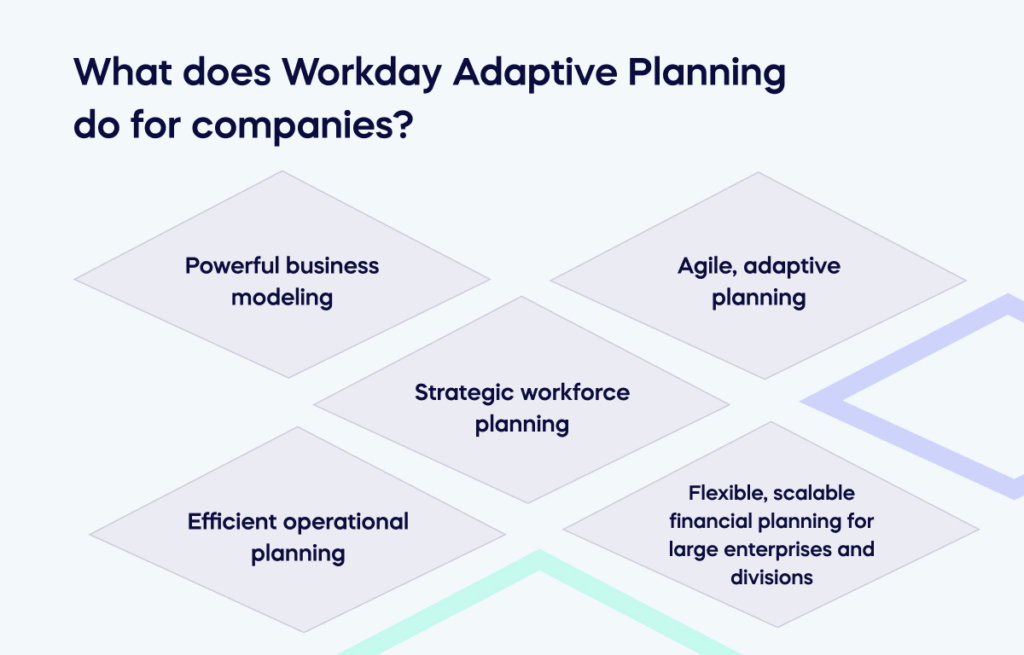
Adaptive Planning aids enterprises facing financial processes such as manual data handling, limited scalability, weak data visualization, inefficient cross-functional team collaboration, disconnected spreadsheets, and inadequate employee training for FP&A.
To tackle these obstacles, Adaptive Planning offers the following features:
- Powerful business modeling.
- Strategic workforce planning.
- Agile, adaptive planning.
- Efficient operational planning.
- Flexible, scalable financial planning for large enterprises and divisions.
The Adaptive Planning tool encompasses various FP&A solution requirements such as financial modeling, collaboration, analytics, management and board reporting, scenario and what-if analysis, and more. Adaptive Planning offers several financial planning tools, including:
- Profitability Analysis.
- Revenue Management.
- Capital Management.
- Balance sheet and cash flow.
- Expense management.
- Sales planning and financial reporting.
- Real-time financial close and consolidation.
What are the benefits of Workday Adaptive Planning?
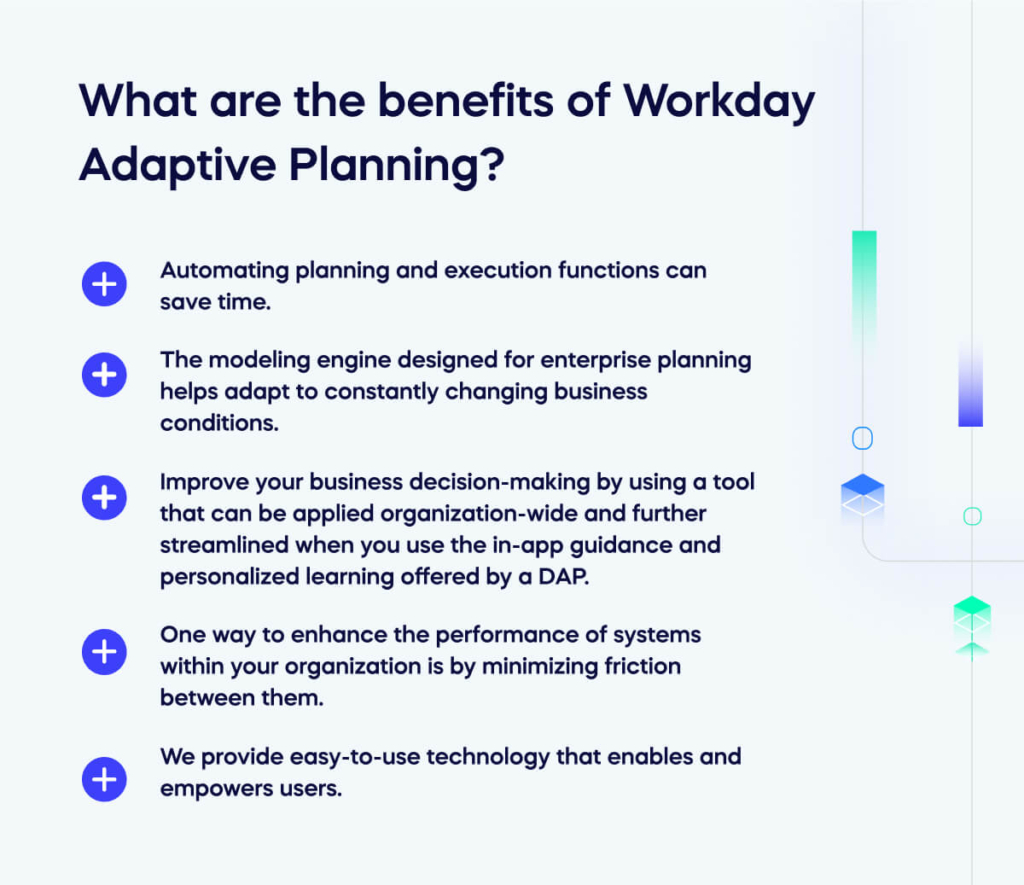
There are many benefits to utilizing Workday Adaptive Planning, including the following:
- Automating planning and execution functions can save time.
- The modeling engine designed for enterprise planning helps adapt to constantly changing business conditions.
- Improve your business decision-making by using a tool that can be applied organization-wide and further streamlined when you use the in-app guidance and personalized learning offered by a DAP.
- One way to enhance the performance of systems within your organization is by minimizing friction between them.
- We provide easy-to-use technology that enables and empowers users.
It is helpful to be aware of these benefits when considering if this software is right for your organization or if a similar software from a different vendor will better suit your needs.
What are the disadvantages of Workday Adaptive Planning?
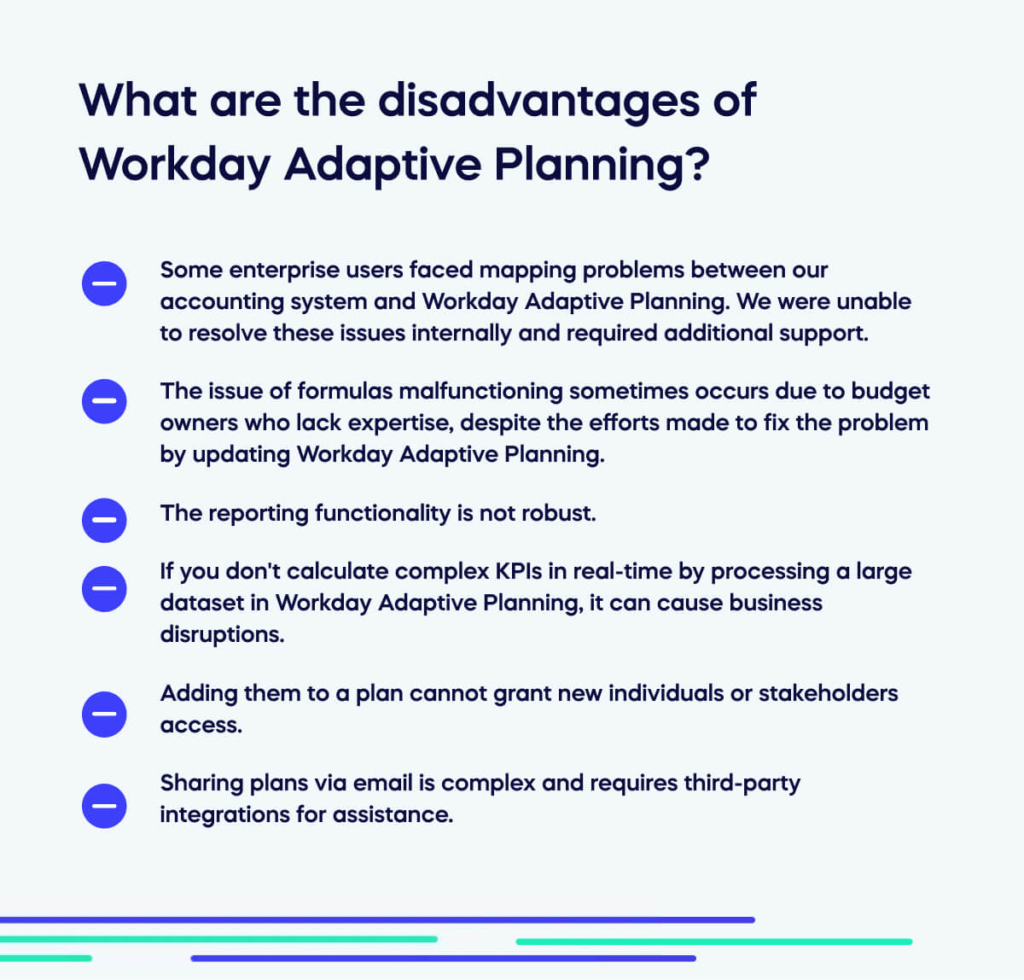
Despite Gartner Peer Insights awarding Workday Adaptive Planning 4.8/5 from 336 industry reviewers, this software does have disadvantages that are essential to consider before investing.
- Some enterprise users faced mapping problems between our accounting system and Workday Adaptive Planning. We were unable to resolve these issues internally and required additional support.
- The issue of formulas malfunctioning sometimes occurs due to budget owners who lack expertise, despite the efforts made to fix the problem by updating Workday Adaptive Planning.
- The reporting functionality is not robust.
- If you don’t calculate complex KPIs in real-time by processing a large dataset in Workday Adaptive Planning, it can cause business disruptions.
- Adding them to a plan cannot grant new individuals or stakeholders access.
- Sharing plans via email is complex and requires third-party integrations for assistance.
Is Workday Adaptive Planning suitable for tech industry enterprises?
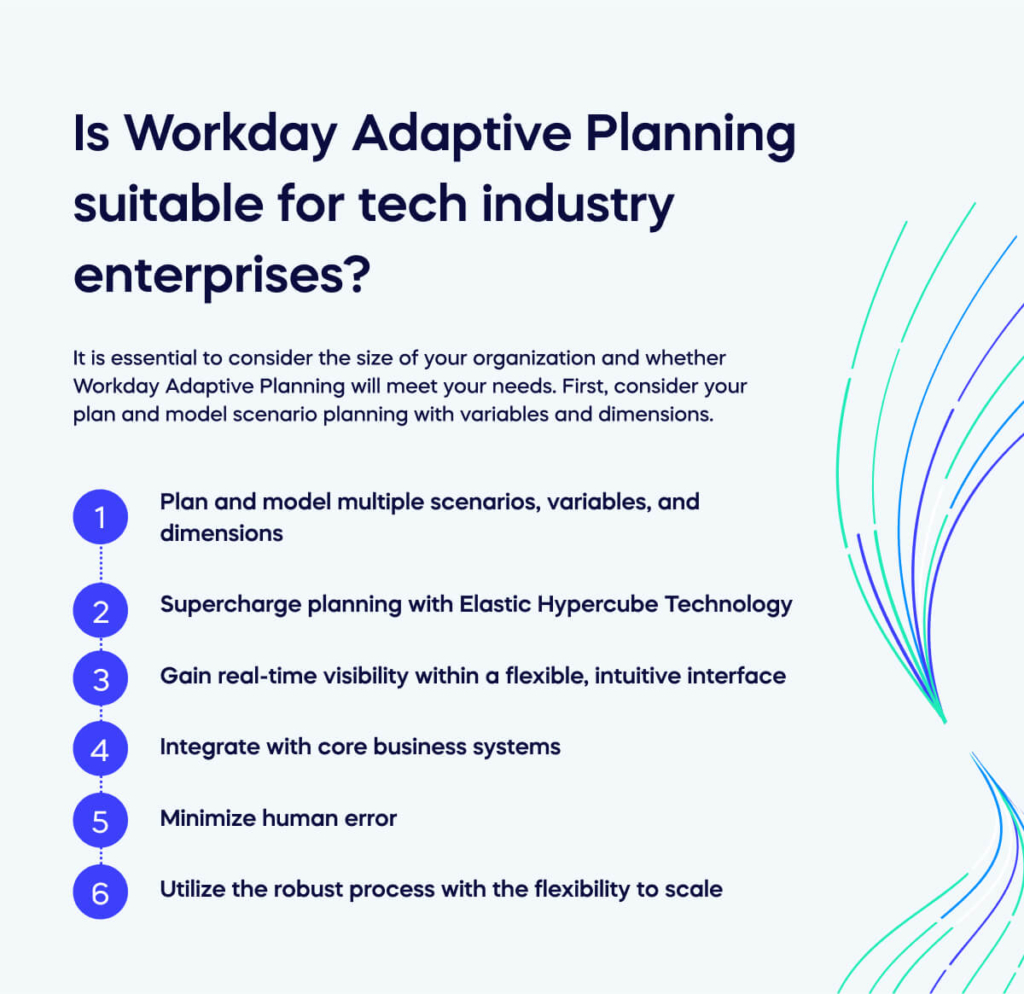
It is essential to consider the size of your organization and whether Workday Adaptive Planning will meet your needs. First, consider your plan and model scenario planning with variables and dimensions.
Plan and model multiple scenarios, variables, and dimensions
Workday Adaptive Planning allows technology companies to develop intricate driver-based models to cater to their requirements as part of business continuity planning (BCP) to reduce the risks of unexpected events.
Examples include:
- B2B enterprise software providers who manage contract subscription waterfalls
- sales rep productivity to gaming companies that anticipate in-game transactions across millions of active users
- high-volume, freemium consumer platforms that prepare ad loads and cohort behavior.
Using a holistic and driver-based planning approach allows companies to adjust quickly to assumptions regarding growth, hiring, and budgeted expenses. This way, they can efficiently observe the effects on financials, recognize potential risks and opportunities, and make appropriate changes.
Supercharge planning with Elastic Hypercube Technology
Workday Adaptive Planning uses Elastic Hypercube Technology, which is patented, to provide both power and scalability while maintaining ease of use.
This technology can handle complex models and scale up memory and computing power to evaluate model elements in parallel. It features domain intelligence designed to help users create and modify functional models more quickly and easily. It is also integrated with Microsoft Office to facilitate the rapid generation of board reporting.
Gain real-time visibility within a flexible, intuitive interface
Workday Adaptive Planning provides a dashboard that can be customized to fit the needs of a technology organization. It allows analysis of essential business drivers across all aspects of the business.
In the web-based interface, you can create customized reports with the required level of detail.
You can also swiftly analyze variance at each stage to compare actual and planned behavior. Moreover, the interface is similar to Microsoft Excel, making it easy for all employees to provide input, regardless of their training.
Integrate with core business systems
Technology companies’ IT infrastructures have become more complex, so they can no longer isolate critical business functions and data in separate silos.
Workday Adaptive Planning allows for comprehensive planning, analysis, and reporting within the most restrictive regulatory frameworks by integrating with other core business systems and external data sources.
Minimize human error
Today’s high-growth organizations require operational planning and reporting that spreadsheet-based systems cannot provide. These systems are prone to errors, inefficient, and unsuitable.
With Workday Adaptive Planning, you can rely on automated technology that continuously plans and utilizes data from various aspects of your business, minimizing manual intervention.
This outcome results in a more efficient budgeting, planning, and forecasting process that can improve productivity by more than 70%.
Utilize the robust process with the flexibility to scale
For software and technology companies that desire rapid growth, having effective business processes and systems in place is crucial. Workday Adaptive Planning helps create a plan that can be reviewed, analyzed, and adjusted during execution.
Doing so enables companies to make better decisions, streamline processes, and allocate resources strategically. The outcome is a more agile organization that can compete successfully over time.
Adopt Workday Adaptive Planning with a DAP
Workday Adaptive Planning is an innovative and robust solution streamlining organizations’ financial planning, forecasting, and budgeting processes.
By adopting Workday Adaptive Planning with a DAP (digital adoption platform), companies can leverage a comprehensive toolset and a structured implementation approach to maximize the value of their financial planning efforts.
When a company embraces Workday Adaptive Planning with a DAP, organizations can enhance their financial planning processes and achieve greater agility and accuracy in their forecasting and budgeting activities.
Doing so ultimately drives more efficient corporate performance management, higher business growth, and success.
